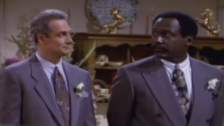[ad_1]

Some 24 years before marriage equality became the law of the land in the U.S., the Fox sitcom “Roc” broke new ground by presenting a gay wedding on mainstream television.
The series, which aired from 1991 to 1994, starred Charles Dutton as Charles “Roc” Emerson, a Baltimore garbage collector and family man, and Ella Joyce as his wife Eleanor, a nurse.
A season 1 episode titled “Can’t Help Loving That Man” introduced audiences to Roc’s gay uncle Russell (played by Richard Roundtree), who surprised his family members when he revealed plans to tie the knot with his male partner, Chris (Stephen Poletti). In what’s believed to have been a network television first, the 1991 episode concluded with the mixed-race couple’s wedding ― which, since same-sex marriage was still years away from being legal in any U.S. state, amounted to a symbolic commitment ceremony.
In the latest episode of his “Culture Cruise” video series, Seattle-based writer Matt Baume takes an in-depth look at “Can’t Help Loving That Man,” which ― at least for the time being ― has been all but lost to history, as “Roc” isn’t currently available on a streaming platform or in regular syndication.
As Baume points out, the episode set itself apart from earlier portrayals of LGBTQ characters on TV by acknowledging that queer people “aren’t all troubled and lonely and sad” and “that we can actually meet each other and fall in love and have a nice life.” Russell and Chris, he adds, became recurring characters on the series as opposed to being single-episode guests.
Pointing to gay-themed storylines on “The Golden Girls” and “Married… with Children” that aired around the same time, Baume notes that the overriding cultural mindset regarding the LGBTQ community was “changing when this episode aired, so it came at really a remarkable time in TV history.”
Baume also interviews the episode’s producer and writer, Jeffrey Duteil, whose credits include “The Golden Girls,” “Saved by the Bell: The College Years” and “Head of the Class.”
Duteil, who identifies as gay, said audiences were “overwhelmingly supportive” of “Can’t Help Loving That Man” immediately after it aired on Oct. 20, 1991.
“[The network] got back to us on the next day and told us they couldn’t be more pleased with the way that it turned out,” he recalled.
Russell and Chris’ relationship on “Roc,” of course, may not seem as complex or nuanced as those of queer characters on TV and in film today. Still, Duteil believes his characters helped lay the groundwork for queer-inclusive storylines on later shows such as “Will & Grace” and “Glee,” and thus helped advance the LGBTQ rights movement in a small but significant way.
“I think that’s made a tremendous difference,” he said.
[ad_2]
Source link

